#quick question do you understand the concept of narrative precedent. do you know what set ups and payoffs are.
Explore tagged Tumblr posts
Text
hey. can people please stop parroting "stan only regained his memory because it's a disney show" like it's an objective fact and somehow a storytelling flaw? because that's reductionist and straight up untrue. stan regaining his memory is not a random deus ex machina, it's clearly established earlier in the season that the memory gun isn't permanent via mcgucket's storyline. as soon as mcgucket watches the tapes in society of the blind eye, he begins to gradually heal and regain his memories. it makes perfect sense that mabel's scrapbook (and in journal three, stan and ford's old home movies) would function the same way for stan.
realistically, stan probably wouldn't have remembered his entire life in the span of a week, but his recovery is obviously being condensed for the sake of pacing. there's a ton of awesome fanworks based on the idea that he's still recovering new memories long after the end of the show, particularly from the darkest period of his life when he was homeless and estranged from his family. but that's not relevant to the finale. what matters for the show's purposes is that stan remembers the events of the past summer, so that his goodbye with dipper and mabel at the end of the episode holds dramatic weight. because THAT'S HOW YOU WRITE A STORY.
#this may or may not have been brought on by the gt live stream#“stan regains his memory because god forbid a story have stakes” THAT'S NOT WHAT STAKES MEAN???#the worst possible outcome does not have to take place in order for a story to “have stakes”. it just needs to be a possibility#THE WORLD ALMOST ENDED#there's your stakes#every time someone says that the scrapbook jogging his memory was a random deus ex machina i want to scream#IS MCGUCKET A JOKE TO YOU???#quick question do you understand the concept of narrative precedent. do you know what set ups and payoffs are.#you can tell i am very calm about this and not at all infuriated#gravity falls#gf#gravity falls spoilers#weirdmageddon#stan pines#stanley pines#grunkle stan#fiddleford mcgucket#society of the blind eye#gt live#being vague posted about lol
234 notes
·
View notes
Text
The Not-So-Amazing Mary Jane Part 30: AMJ #4.2

Previous Part
Next Part
Master Post
This post is something of an exception in my coverage of AMJ. Originally I hoped to dedicate just one post per issue but changed that to two due to the length. The pages I’ll be covering here though are exceptional.
Not just because I had so much to say about them, but because they cut to the heart of the story. These pages present Williams’ attempt to finally justify MJ’s actions throughout the story. As such I’ve opted to single these pages out in this instalment and continue covering the rest of the story next time.
If you want the context for the preceding pages check out the previous post.
The pages revolve around MJ chatting with Master Matrix. It turns out he knows ‘McKnight’ is really Quentin Beck. She thanks him for keeping their secret. Master Matrix asks MJ how Spider-Man feels about her working with Mysterio; I guess he knows about her connection to Peter too.
MJ gets a little flustered by this question. MM continues that he’s questioned how to raise this subject with Spidey himself. MJ relates to this and explains that Peter knows she’s working on a Mysterio movie, just not with the man himself. MM asks why she’s deceiving Peter. MJ explains she isn’t being deceitful on purpose (um…yeah she is) but is just protecting Beck because she believes in what he is doing.
MM makes the (incredibly obvious) point that Mysterio is a villain and Spidey is good. He elaborates that they are both hiding the truth from a good person to collaborate with a villain. MJ responds by asking if MM understands the concept of redemption. He says he does.
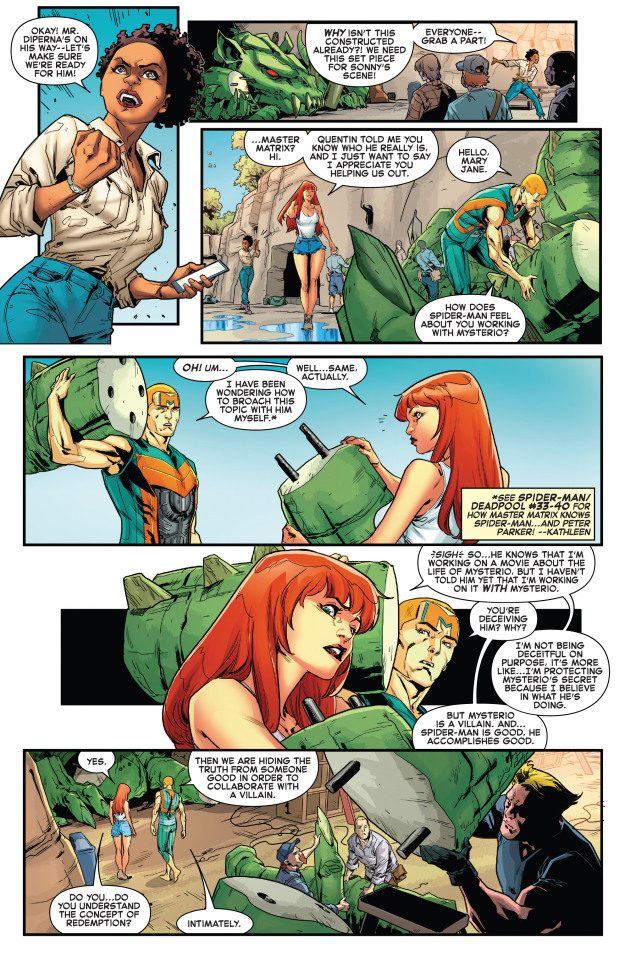
Lord have mercy, this page is awful.
Now I should be upfront. I didn’t read Spider-Man/Deadpool so maybe I need to be set straight about certain important details from that title. I don’t know how or why Master Matrix knows who Spider-Man is for example. My brief research tells me he was rescued by Peter’s parents or something. I don’t recall seeing anything about Mysterio when I read up on him, so I don’t know how or why he’d know ‘McKnight’ is really Beck. Maybe his abilities allow for him to deduce that fact? If not, then that’s yet another hole in the story.
Anyway, the point is he knows Peter is Spider-Man, keeps in contact with him and by extension knows about (or has deduced) MJ’s connection to Peter. What’s less clear is how Mary Jane knows about MM’s connection to Peter. We’ve never seen them talk about him or any of Peter’s adventures with Deadpool for that matter.
I’m willing to accept that personally I guess. As I went over in parts 3-5, Peter does clue MJ into major events in his Spidey career. I suppose befriending a living Weapon of Mass Destruction would count as something your partner ought to know about. This ultimately hurts Williams’ own narrative though. It demonstrates that Peter has been very honest and open with MJ whilst she hasn’t. It also further proves that Peter would inform MJ of his hero career, which would include Beck and his past crimes. Therefore MJ would very likely know about all the stuff Beck did in ‘Guardian Devil’ and just about everything else we discussed in parts 3-5. And yet, she’s still getting chummy with a murderous, sexually violating monster.
We then come to the lame-ass attempt by Williams to address MJ’s motivations for this arc. First of all, Williams thinks now this is the best time to address that elephant in the room? It’s the penultimate issue of the arc (originally the entire series)! This shouldn’t been pinned down by issue #1 or #2 at the absolute latest.
Lateness aside, Williams’ attempt (unsurprisingly) utterly fails. MJ comes off almost childish when she says she isn’t ‘being deceitful on purpose’. A quick look at the definition of deceit proves that to be bullshit.
It’s the equivalent of saying “I’m not lying. I just happen to be withholding certain truths.”
Yeah that’s lying by omission, which is a form of deceit!
As for her justification for deceiving Peter, I’ve gone over that more than enough. MJ wouldn’t believe in what Beck is doing. Or at least she never would to the point where she’d lie to Peter the way she is or protect a terrible person like Beck.
The audacity of Williams to bring up how MJ is protecting a villain and deceiving a hero is unbelievable. It’s honestly left me flabbergasted. So, Williams KNOWS that’s what she’s written MJ as doing? She KNOWS that but she’s still having MJ do it? Or is she really just incredibly unaware and paying lip-service?
Maybe the next page will enlighten us.
So MJ just asked if MM understands redemption, which he does intimately. She follows up by saying he’d understand then that it’s not a simple switch from bad to good. Rather, it’s a journey that takes a lot of work; work Beck is putting in right now. MJ feels she is protecting Beck’s ‘journey’. It isn’t that she thinks Peter incapable of understanding this (quite the contrary), she just hasn’t figured out how to tell him. She doesn’t want him to worry about her and feels he is already got enough on his mind.
MM then asks what if MJ has misjudged Beck? To this she concedes she will have deceived Pete, which makes her feel sick.
MM then reveals he was created as a WMD and that he is sure Beck knows tha. He elaborates that when Beck approached him, he presumed it was for the sake of efficiency. However, now he realises it’s because Beck wanted to give him the chance to make something meaningful. In this sense Beck has used his own journey of redemption to protect MM’s own. MM feels utterly indebted to Beck for this.
MJ responds that all MM can do is earn that debt in reverse.
Meanwhile, Diperna has arrived. Screwball has been harassing the journalist with her drones this entire time and continues to do so out of pure fun.
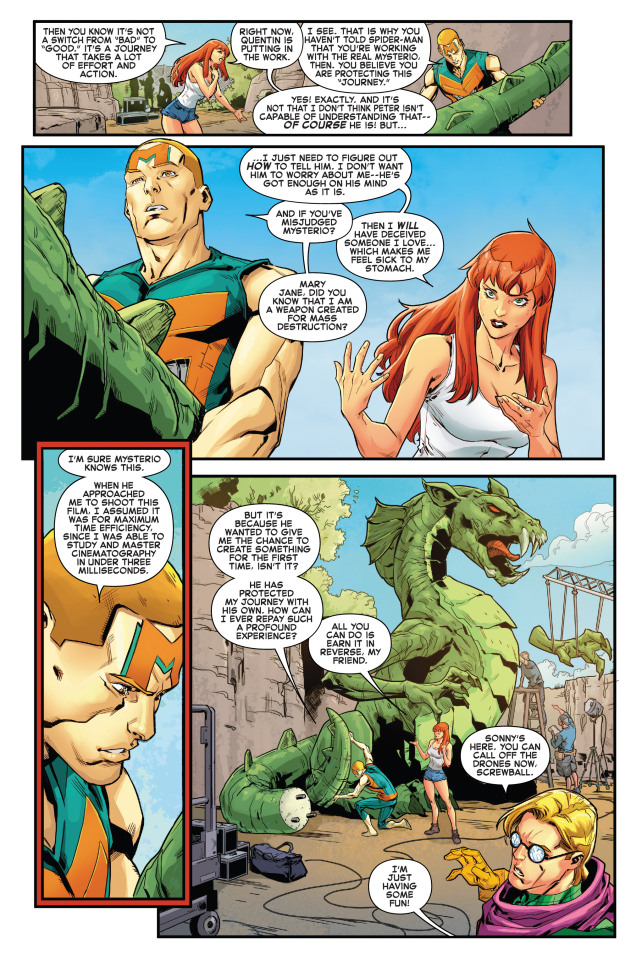
Jesus Christ where to start with this.
MJ is correct that a journey of redemption is more than just a switch from bad to good. It is indeed a long hard journey.
But as I’ve illustrated in parts 9-11, MJ wouldn’t extend the possibility of redemption to Beck given what she knows about him. His actions in this story so far do not reflect someone who’s ‘putting the work in’ at all. He’s evaded the law, broken (and is still breaking) numerous laws to get to this point and shows no signs that he’s going to face the music for his crimes. He’s not even attempted to make amends to the people he’s wronged beyond his old flame Betsy. His attempt with her has been mutated due to MJ to the point where it’s hardly what Beck intended in the first place. Even if it was his ‘apology’ to Betsy would’ve amounted to making her look cool and sexy which by extension glorified himself. Every one of his attempts to help people like Master Matrix have ultimately benefitted himself.
The closest he’s come to honest self-sacrifice, of doing something good purely for the sake of others, was fighting the Savage Six last issue. But even that was selfish to a point. He had personal beef with the Vulture. They were trashing his movie. In defeating them and protecting his staff he was in turn aiding the protection of his life’s work. In contrast, I detailed several instances in part 10 where criminals put themselves on the line to help people selflessly. Boomerang, Black Cat, Sandman, Venom. All of those people risked their freedom and/or their health for Spidey, for innocents or for the grater good.
Beck hasn’t done that yet. Everything he’s done, even if it has protected innocent people, has simultaneously served his own materialistic or egotistical goals. Hell, given the ease with which he dealt with the Six, it barely qualifies as putting himself at risk.
Extending a helping hand to people like himself is not grounds for putting the work in. He’s helping other criminal/dangerous people make something meaningful. So what? Will he be donating the money to the loved ones of the people he’s hurt? Or to the people thsmselves? Is he going to create a trust fund for Gwyneth’s baby? We know he isn’t going to apologise for his evil actions though the film because MJ said so back in issue #1.
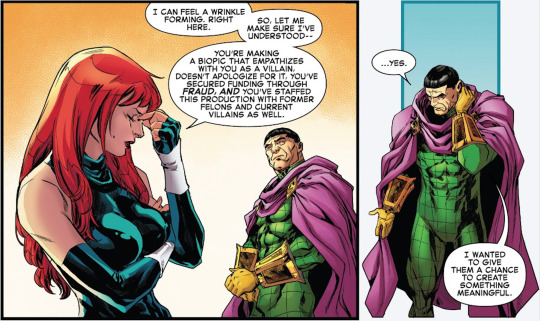
MJ is protecting a murderer, a mental abuser, a sexual abuser and a generally horrible person. Someone who wants forgiveness but has not actually demonstrated anything in the way of repentance for his actions. As AMJ laid out, he wants to be forgiven by making everyone understand who he is and why he did what he did.
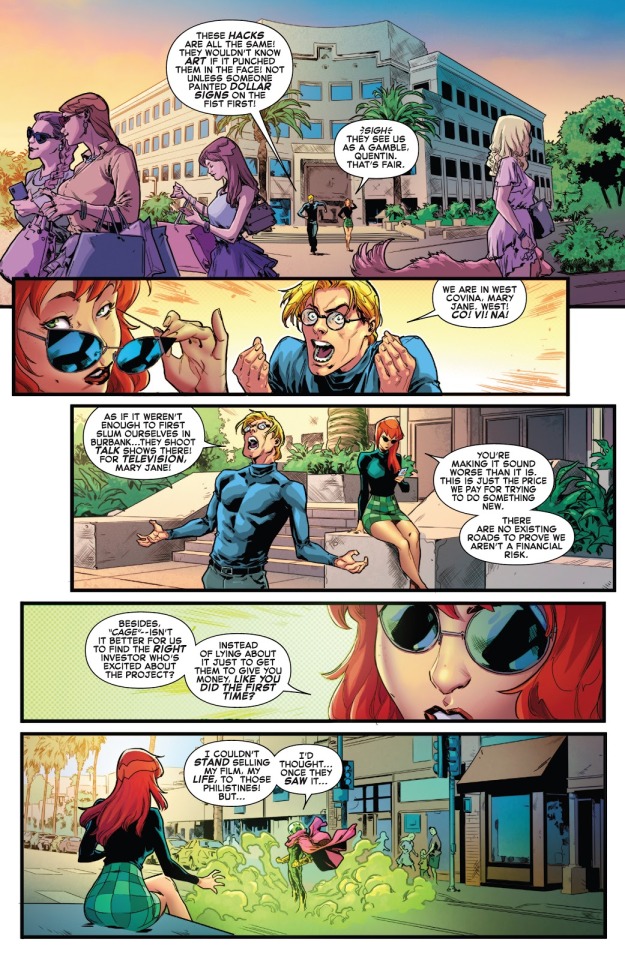
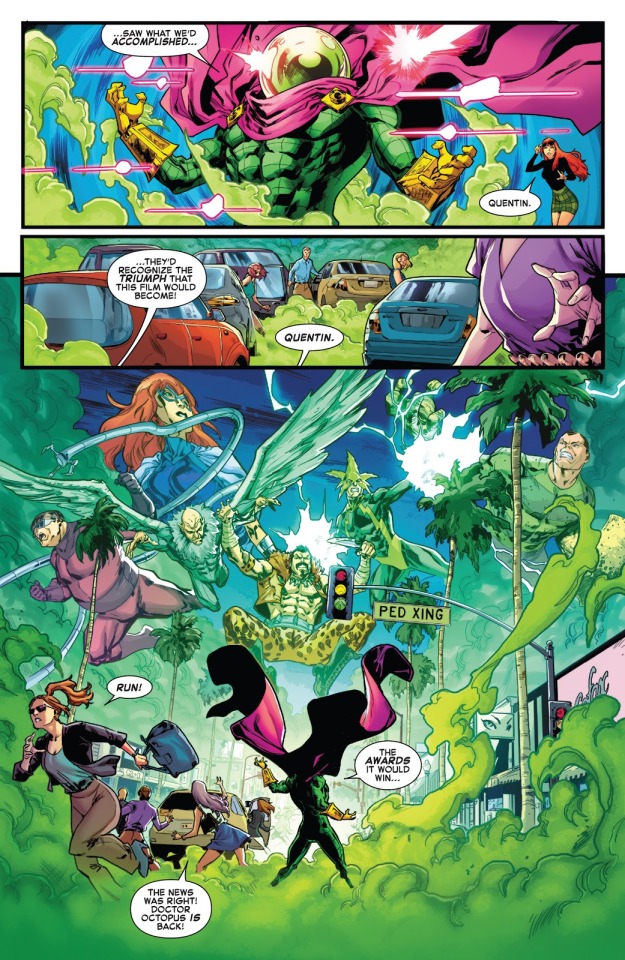
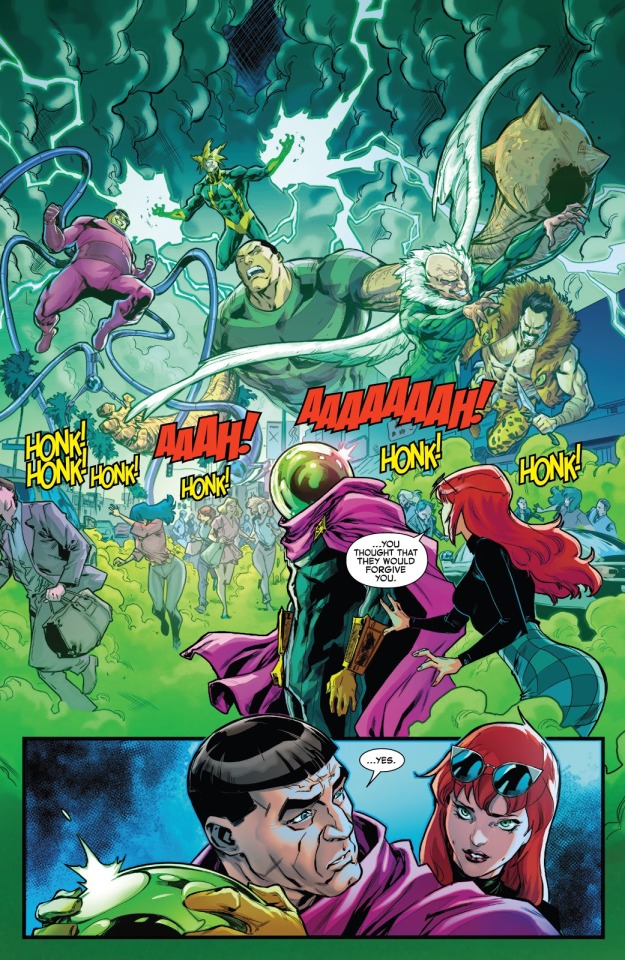
He (and seemingly MJ and Williams) is confusing understanding with justifying. We can understand how and why people did something bad. That’s very different to justifying it and thereby forgiving them.
Even in the over simplistic good/evil world of super hero comic books this is simply not how redemption works. In addition to the examples I listed in part 10 let’s consider an example from a comic book movie.
Maybe you’ve heard of it, it’s called ‘Spider-Man’ from 2002.
In the film a guy named Peter Parker confronts the man he believes murdered his uncle, the man who raised him. The criminal is scared but not apologetic for what he’s done, and he asks to be given a chance. Peter’s response is.
What about my uncle? Did you give him a chance?
youtube
We can very much apply this to AMJ. Beck wants a chance, MJ is giving him that chance. So I ask:
What about Gwyneth?
What about her parents?
What about her baby?
What about the families of the seniors Beck swindled?
What about the real Cage McKnight’s reputation?
What about all the people terrified by Beck’s tantrum in AMJ #2?
What about all the people Screwball or Kangaroo have hurt?
What about Dr. Winhorst?
What about all the people and all the animals harmed or killed when Doc Ock heated up half the globe?
What about all the people scared or hurt when he faked an alien invasion in ASM v5 #1?
Did Beck ever even hint he gave any of them the slightest chance?
No. He didn’t.
For God’s sake, a terrible story like ‘Venom: Lethal Protector’ wasn’t as naïve or childish as this story. Venom is called out for murdering a man’s son. He acknowledges this but tries to argue he didn’t mean to kill him. The story though doesn’t let him off the hook for it.
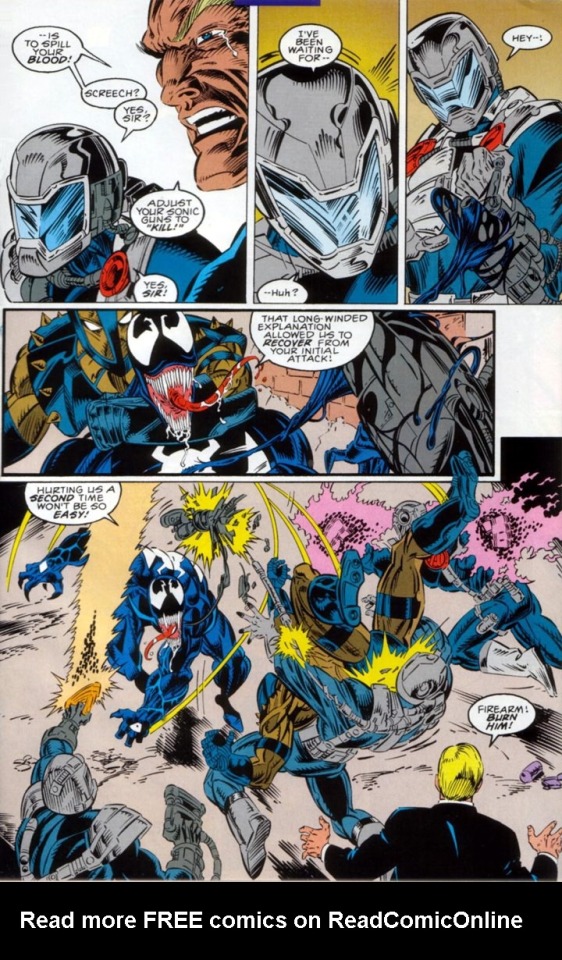
If a 1990s Venom mini-series can acknowledge a homicidal maniac shouldn’t be given a chance just because he’s sorry, then why the Hell can’t this story?
There is another great non-comic book example that illustrates this point. It comes from the Doctor Who episode ‘Boom Town’. Whilst not a comic book or superhero story, Doctor Who is often regarded as a cousin of sorts to the former. Marvel even made Doctor Who comics for a long time.
In the episode in question, the Doctor shares a ‘last meal’ with an alien criminal whom he intends to hand over to the authorities.
She is guilty of murder, attempted genocide and fraud and identity theft in the vein of Beck; although she is literally wearing the skin of the person she’s impersonating. To gain the Doctor’s mercy she tries to prove she’s changed, specifically by explaining a time she spared a life. Earlier that day she readied herself to kill a young journalist sniffing around her plans, but refrained upon learning she was pregnant.
The Doctor believes the story but is totally unconvinced. He explains it doesn’t mean anything. Every now and then terrible people on a whim happen to be kind and spare their would-be victims. It’s how they live with themselves.
youtube
Whilst Mysterio is probably nowhere near as bad as the alien criminal, his case for forgiveness is arguably worse.
He’s continuing to steal the real Cage McKnight’s identity, he has never indicated he’s going to continue to help people after the film is completed. He caused panic and would’ve caused harm had a third party (MJ) not intervened to keep him under control. And his equivalent of sparing a life amounts to giving other criminals the chance to help realize his personal vanity project.
Not to mention, MJ and Beck continuously insist upon the movie being something meaningful but how could they possibly know that. A movie isn’t meaningful just because it means something to the film makers. The audience decides if it’s meaningful or not. Frankly Beck’s insistence he’s giving his staff the chance to make something good and meaningful is egotistical. As though the mere act of film making or his own life story is inherently something with artistic merit or something meaningful in the universe.
Yes, some films are. But even then their ability to do something helpful and positive is relatively limited. A piece of media’s practical abilities to positively contribute to the universe is limited compared to say, donating time or money to the needy. At least there you would’ve done something with a definitive impact even if it was a small one. A movie like this might illicit emotions and make some people feel happy, might inspire them to do good, might make them understand themselves or another better. But the key words there are ‘might’ and ‘maybe’.
When you get right down to it, even the most influential movies don’t positively contribute helping people as much as individuals actually actively doing stuff to help others. I mean are we really going to say the ‘Black Panther’ film had as much of a positive impact as the Civil Right Movement?
Absolutely not.
Let’s use a fictional example. Would the stage play about the Fantastic Four (as seen in ASM v5 #25) have been as meaningful as the efforts of the actual Fantastic Four in fighting Galactus?
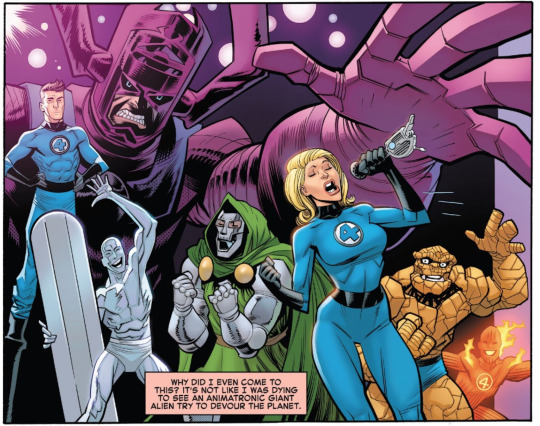
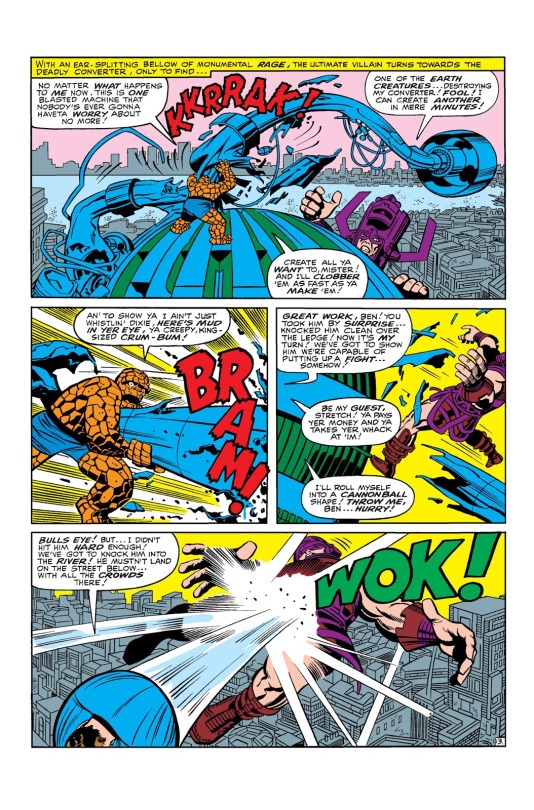
Absolutely not.
I’m not saying films don’t matter or can’t have a meaningful positive impact. I’m just saying if Beck wanted to achieve the latter, there were better options than making a film about himself.
He could’ve donated his ill-gotten gains to needy communities. Or handed over his technology and techniques to the public? Or used his skills to expose white-collar criminals? Or even have started up a company selling his technology and employing criminals semi-legally reducing the need for them to resort to crime.
But he didn’t. He’s fulfilling his own personal dream and making himself centre stage.
As for MJ lying to Peter because she doesn’t want him to worry and has his own problems, see parts 17-18 for why that’s bullshit. And see parts 19-23 for why Peter, and MJ herself, should be worried about her in this situation. And that was before the Savage Six made them a target, a fact that should have resulted in Peter already being worried.
Hypothetically even if this wasn’t something to worry about, MJ could be open about it with Peter and convince him to relax. He begrudgingly accepted her staying with him during Marvel Knights in spite of the dangers to herself.
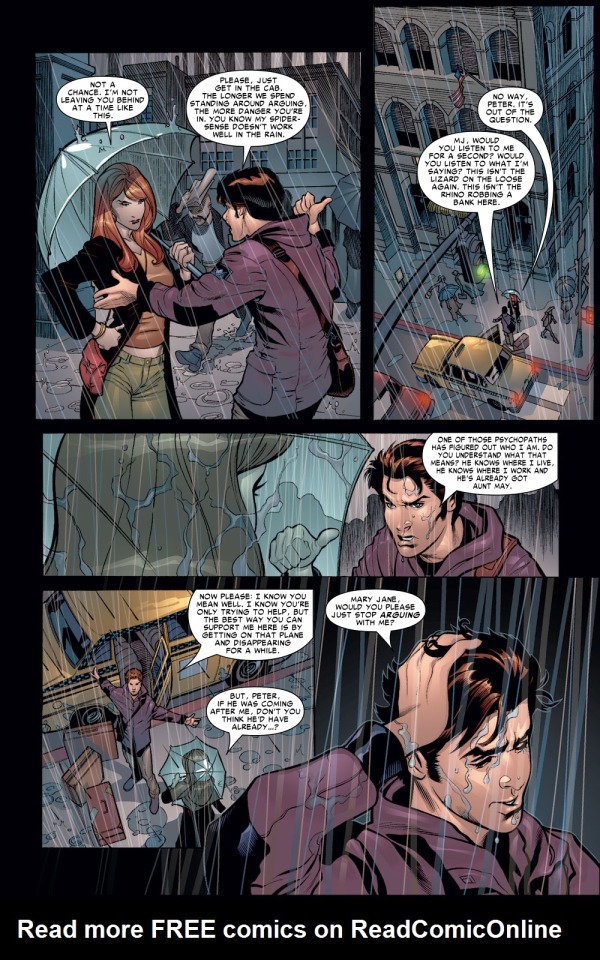
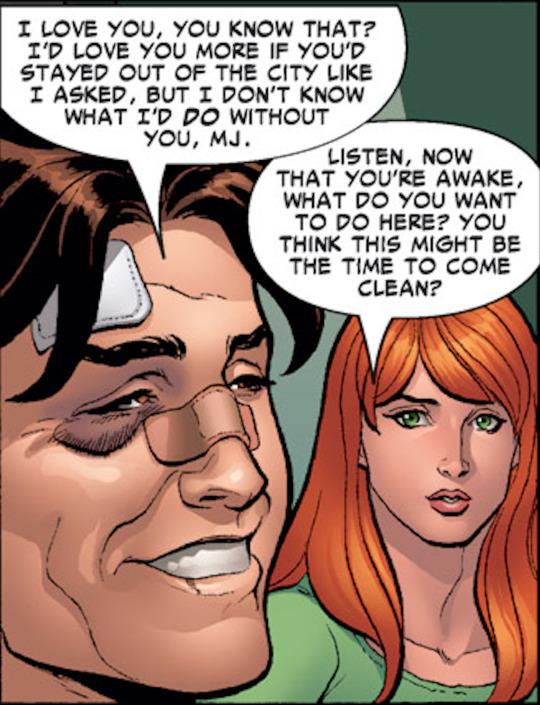
She equally made him see sense in ‘Parallel Lives’ after their home had just been attacked.
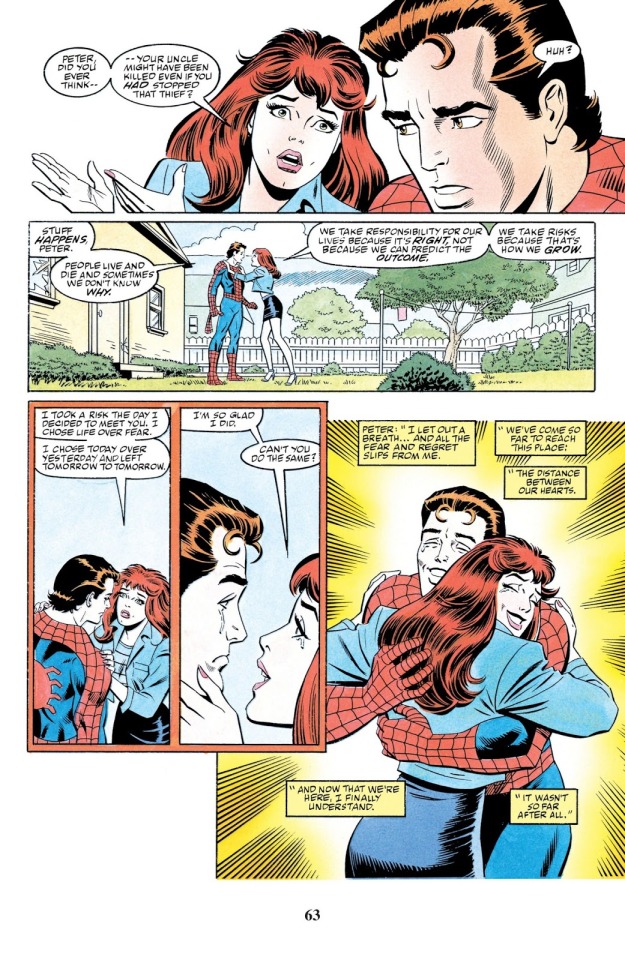
Whilst this situation is something to be concerned about, if MJ was in fact in no danger, then she could talk Peter around to trusting her.
I’ll also add she’s had plenty of time to figure out ‘how to tell him’ the truth. She knows he’s living with Boomerang so right there that’s a potential route to breaking in the conversation. She could bring up Venom, or Sandman or Felicia. There are multiple people they’ve mutually given chances to that could be used as a way to engage with Peter on this topic. By this comic’s own brand of ‘logic’ those are perfectly viable arguments MJ could use.
Don’t get me wrong. Those are false equivalencies. But I’m just saying Williams’ clearly doesn’t think this situation is any different to those ones, therefore there are plenty of grounds for MJ to talk to Peter about this. She even has MJ say ‘of course’ Peter would understand.
It’s almost like Williams knows that this situation cannot actually be justified. Or she’s injecting contrived false drama for the sake of drama with no mind paid to established characterization.
Hence we get trite like MJ saying she ‘will have deceived’ Peter if she’s wrong about Mysterio. First of all, Williams is again acknowledging how asinine her narrative is. She’s acknowledging that MJ is gambling that her judgement of Beck is on point. Her judgement of a guy who’s power set revolves around misdirection. Second of all, MJ wouldn’t have deceived Peter if she’s wrong. She’s already deceived him and is continuing to do so. Thirdly why exactly does Mary Jane get to be the singular person deciding if it is okay to gamble on Beck’s redemption? Who is she exactly to decide if this murderer and abuser is worth keeping out of jail?
In the real world if such a risk is taken it doesn’t ride upon one person’s decision; at least not in theory.
Let’s move onto Master Matrix. Again, I don’t know enough about him to discuss Beck’s knowledge of him. Maybe it makes sense, or maybe it’s a big question that’s being left unanswered. Regardless, I detest framing Beck as this selfless redeemer through Master Matrix’s subplot. I hate it almost as much as I hate the nonsensical dialogue that follows it.
What the fuck does ‘earning it in reverse’ even mean? I guess it means living up to Beck’s trust? But then why not phrase it that way? Even if that was the intent, see above for why giving MM a chance doesn’t really mean anything. Not to mention, both MM and MJ are just kind of presuming that Beck was in fact being altruistic.
That’s all for now. We’ll resume coverage of the rest of the issue next time.
Previous Part
Next Part
Master Post
#Leah Williams#Carlos Gomez#Amazing Mary Jane#mjwatsonedit#mary jane watson#Mary Jane Watson Parker#MJ Watson#Mysterio#Quentin Beck#Spider-Man#Peter Parker#Black Panther#Venom#Eddie Brock#Venom Symbiote#Black Panther 2018#MCU#marvel cinematic universe#Doctor Who#Spider-Man 2002#Spider-Man the Movie#Galactus#Fantastic Four#the fantastic four#fantastic 4#The Fantastic 4
12 notes
·
View notes
Text
Hyperallergic: The Physics of Race, History, and Everyday Life
Starting with her title, Field Theories, Samiya Bashir challenges the vocabulary of science, finding inflections and echoes within that vocabulary of the long and brutal history of race and racially based economic exploitation in the U.S.A. When used within the respective sciences of physics, psychology and social science, the term “field theory” (singular) has specific meanings. “Unified field theory,” in particular, coined by Albert Einstein, refers to the attempt to find a single framework behind all that exists (gravity, however, continues to escape this effort). But by changing “theory” to “theories,” (plural) Bashir subverts that idea of a singular framework to reveal the multiplicity of reality: where there is one reality there will be other realities told in various forms, splitting the dominant narrative into a prism of narratives. In contrasts and convergences, she questions history (histories) and how it is (they are) articulated in even the most objective of “fields.” In fact, “field” itself is a loaded word within slavery’s context, indicating enforced agricultural labor.
Field Theories is organized into five sections, three of which include a subsection titled “CORONAGRAPHY,” comprised of a crown of sonnets, also known as a “sonnet corona.” Coronagraphy refers to the “coronagraph,” a device for viewing the sun’s corona, along with faint or invisible planets, stars or comets around the sun, by blocking the sun’s direct light. In this sequence of fifteen sonnets (which includes a final “mastersonnet” that qualifies the series as a “heroic” crown), mythic American figure John Henry — known for winning a race to hammer steel faster than a steam-engine only to die from the effort — recounts, together with his wife and fellow steel-driver, Polly Ann, the lifelong, relentless expectation of physical labor, from birth to death.
When I said—Mama? she dropped me clear to
the floor and jumped back quick—Mama I’m’a
be—but she dropped her head in her hands and
cried—Papa I’m’a be steel—I started
—I’m a die with my hammer my—was I
born with it?—Mama don’t cry. I’m’a be—
Typical of the sonnet crown sequence, each poem begins with a word or words drawn from the last line of the preceding poem, setting up a remarkable series of responses between two people whose relationship exists within work, labor, and unbearable constriction. Polly Ann calls herself “useful” because of her “milking body” and states “all my time I spend picking up/ putting down moving things around and still// I can’t drown out the whop whop whop of steel…,”
I swear I wasn’t born to cry so I’d
be a lie if I say I wept when I
left my mama’s house—like I ain’t know life
up here would be hardscrabble rough—what’s not?
The stories of John Henry and Polly Ann are part of what coronagraphy reveals, eclipsing the too-brightly spotlighted stories of white America. “Dark things have a way of manifesting themselves,” says Neil deGrasse Tyson, in one of the section epigraphs by African American writers, artists, scientists and astronauts such as June Jordan, Mae Jemison, Keyon Gaskin, Jean Toomer and others. In that vein, Bashir explores the concept of the “blackbody,” a scientific term for something that absorbs all radiation — in contrast to the supremely reflective “whitebody” — as the blackbody converges with the “black body” existing within the racist American economic, political and cultural system.
“When I say radiation I mean
light that you cannot contain”
—“Methods of heat transfer”
In addition to blackbody theory, “Field theories” addresses a spectrum of scientific concepts and how they might intersect with everyday life — and poetry. The five larger sections of the book count down through the laws of thermodynamics starting with “consequences of the laws of thermodynamics,” through the first, second and third laws and ending with “Zeroth law,” which refers to the equilibrium between three thermodynamic systems. Within these sections, a range of poems are titled variously after additional scientific concepts, such as “Planck’s constant” or “Law of total probability” (but also interspersed with the occasional title such as “Universe as an infant: fatter than expected and kind of lumpy.”). The dissonance between the scientific titles, and the concepts they denote, with the content, and form of the poems often creates cognitive openings for understanding how science, history, life and poetry intersect.
Like the laws of physics, which determine and undergird these “everyday” experiences, race determines and undergirds everyday experiences, as well: poet Fred Moten has discussed how large race is — so large that one cannot outrun it. In the particularly powerful “Law of total probability,” a law that, according to Mathspace, “allows us to calculate the likelihood of an event whose occurrence is influenced by which of several other disjoint events occurs,” the text is disrupted with bullet-shaped lacunae, obstructing the narrator’s tale of meeting a security guard who shows off his own gun to overcome the narrator’s “fear no implacXX terror of guns”: “nothing culd be safXXhan a gun in good hanXXfety engaged nothing to fear — see aXX when it went off its bulleXXore through old guy’s security desk anXX whizzed past my hip so close it burned the breeze.” How was this modern-day occurrence influenced by gun rights, and how are gun rights influenced by racism and the history of slavery, the need to keep the slaves contained? And even in the distortion of poetic form — the poem shot through with holes—how does the poem become another “event” as well, shaped by all of these factors?
The “blackbody” is also sometimes in physics defined as a “hole in a container” that captures and holds radiation. Within this definition is the deep echo of the captured black body and continual motion of escape — think of Henry “Box” Brown enclosing himself in a container to escape slavery. And yet, Bashir also asks how the black body exists today, in the incoherence of American culture. The poem, and the shape of the poem, may be a kind of container too — it catches and contains these questions and observations, which in turn shape it — the coronagraph is shaped by the radiation it chronicles. How, Bashir asks often in her poems in all their various forms, can we exist today in this place, in this time, as who we are? How do we stay and be, as a blackbody/black body?
But this is the world spinning in the vast
dark. Not any of the million spots we
see in the night sky but the one we
can’t. Rushing to the serenity shop
And fighting and hiding and crying and
eating in our cars with our volume pumped
against the birdsong. We are animals.
We need orgasm regularly. Now
even that lies just out of reach hostage
to the ding of our nearby cells—a poke
a text a like a love a comment: WELL
DONE! Aaaahhh! Aaaaahhh! Aaaah. Aaahhh. Aaahh. Aaah. Aah. Ah. a.
Yearn for the road. Ache for the unfettered
journey. Grow weary of it. Namaste
the mat says. Killed people kill people it
says. Shock. Disbelief. Wildly darting eyes.
Same old jive. Look steady through the pane.
Go on. Trust me. Really take in the light.
Field Theories (2017) is published by Nightboat Books and is available from Amazon and other online booksellers.
The post The Physics of Race, History, and Everyday Life appeared first on Hyperallergic.
from Hyperallergic http://ift.tt/2ezA3c0 via IFTTT
0 notes